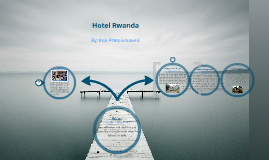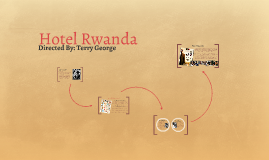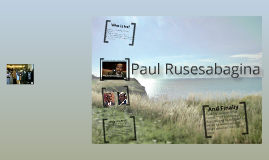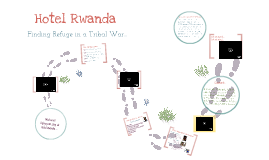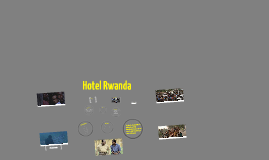Hotel Rwanda
Transcript: During the beginning of the genocide, many Tutsi homes were destroyed and people were left homeless. With no place to go, many people decided to come to the Hôtel des Mille Collines to take refuge. At the beginning, Paul Rusesabagina,the manager of the hotel is not very pleased with this idea because he was scared that he would be putting his guests, family and employees in danger. Paul ends up letting hundreds of people stay because he believed that it was the right thing to do. He risked his life and the lives of others in order do the right thing. One will often risk their life and relationships in order to do what they believe is right. Geographical Milieu Cultural Background Geographical Milieu Hutus & Tutsis The setting in Hotel Rwanda, took place in Kigali, the capital city of Rwanda. Many people in real life who were in Kigali during the genocide, did indeed take refugee at the Hôtel des Mille Collines. At the time of the genocide, there was no water, a part of the hotel caught on fire, and bullets were shot at very levels of the hotel. Since then, the hotel has been restored and repaired. It has been running to this day. Hôtel des Mille Collines Rwanda is a very small country located in the middle of Africa. It is around the same size as the U.S.A state Maryland. In 1991, Rwanda held around 7.7 million people, 90% of them being Hutu and 9% Tutsi. The genocide started out in Kigali with mass-killings, then spread to many places around the country. The genocide caused over 2 million people to become refugees. People traveled to disease infested refugee camps in Uganda, Tanzania, Burundi and the Democratic Republic of Congo (then Zaire) in order to get help. Rwanda Background Thesis Political Milieu By: Asia Przepiorkowski Hotel Rwanda Tutsis: The Tutsis are a cultural group that live in Rwanda, the Republic of Congo and Burundi. This cultural group is part of the minority of the population. They are cattle-herders, and enforced peace by cattle trading. They speak a Central Bantu language, but some also speak French because of the time where Belgium occupied Rwanda. Hutus: The Hutus make up the majority of the population of Rwanda. They are also located in Burundi. The Hutus also speak Bantu as well as French. Although Hutus make up a majority of the population, the Tutsi were superior over the Hutus for a long period of time. This caused the great rivalry between the two culture groups. Hutus main job was farming, which was a lower rank then cattle herding. Scene #2 Morality vs. Relationships Scene #1 In the movie, Hotel Rwanda, the political struggle between two ethic groups, the Hutus and the Tutsis is based on true facts. The Hutus wanted to exterminate all of the Tutsis for what they did to them in the past. In 1916, Belgium colonists took over Rwanda and found the Tutsis to be superior to the Hutus. This caused a lot of up rise since for the next twenty years, the Tutsis were treated much better than the Hutus. They got better educational opportunities and jobs then the Hutus. The first riot happened around the time of 1959 where the Hutus unleashed, killing over 20,000 Tutsis. Three years later, when Belgium declared Rwanda an independent state, the Hutus took over. They were seen as superior over the Tutsis, and thought they were worthless. This political situation led up to the genocide in 1994 which was the main focus in Hotel Rwanda. One of the greatest problems with the genocide was that Rwanda hardly received any help from other countries. The U.N. did come into the country, but only to act as peace keepers which did not help the situation very much. Rwanda ended up having to solve their problem themselves, millions of deaths later. Near the end of the movie, Paul Rusesabagina and his family decide to go with the UN to the refugee camps in order to get away from all the chaos and danger that is going on near the hotel and in Kigali. Just when Paul is about to go on the truck, he looks back on the hotel and all the people that were staying. He decides to stay back and let his family go by themselves. He does not have the willpower to leave behind the hotel and all the unlucky people who were unable to leave to go to the refugee camps. So he risks not being able to see his family again, to stay back and help out with the hotel.






